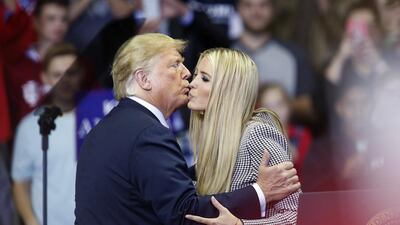This month has already seen a spotlight shine on the rise – and fall – of political families around the world. From the resignation in India of the leader of the main opposition Congress Party, to the arrival of a new Greek prime minister with a family history of political activity, to US President Donald Trump’s robust defence of his daughter Ivanka’s prominence at the G20 summit in Japan, the familial political dynasty has not been consigned to the past.
In Greece, Kyriakos Mitsotakis, son of a former prime minister, brother of a foreign minister and uncle of Athens's recently elected mayor, led his New Democracy party to a clear victory over the populist, radical left Syriza. In India, Rahul Gandhi, a product of the dynasty that has long controlled the Congress, insisted he wanted to relinquish his family's command over the party. And in the US, there are indications that a new political dynasty is trying to establish itself.
There are contradictions in these developments. Are political dynasties on the rise or are they in decline? India suggests decline. So does neighbouring Pakistan. There, cricketer Imran Khan was elected prime minister exactly a year ago, ending, at least for now, the usual alternation in power of two political dynasties – the Bhuttos and the Sharifs. Further afield in Angola, there have been signs of disenchantment with political fiefdoms. In 2017, Angola's ruler of 38 years, Jose Eduardo dos Santos, unwillingly ceded office to a supposedly pliant successor. The new president, Joao Lourenco, speedily worked to loosen the Dos Santos family's political grip over everything, not least the national oil firm and sovereign wealth fund.
But look away from India, Pakistan and Angola, and political dynasties appear to be in rather better shape. In Greece, Mr Mitsotakis’ victory seems to indicate the triumphant return of the old guard. For, not only was Mr Mitsotakis a minister in the conservative government swept out of office by Syriza in 2015, his family is one of three to have dominated Greek politics for years. The Papandreou and Karamanlis families are the others.
As for the US, there seems increasing acceptance of – or at least, little resistance to – the idea of a new political family. Of course, dynasties have always been around in America, with the Kennedys and Bushes being good examples. It says something about the political strength of surnames that in 2019, Joseph Patrick Kennedy III, the grand-nephew of John F Kennedy, is an elected member of the House of Representatives. And that George Prescott Bush, whose grandfather and uncle both served as president, is the current elected commissioner of the Texas General Land Office.
The Clintons are not as yet a political dynasty but that’s purely on a technicality. Bill and Hillary Clinton did not come from political power and are related by choice, not blood. Unless and until their daughter Chelsea seeks political office, the Clintons can’t be described as a dynasty.
Even so, American political analysts sometimes speculate about a Chelsea Clinton-George P Bush face-off in a presidential contest 20 years hence. Or even a Joe Kennedy III-George P Bush contest in 2028.
Then there are the Trumps. With Mr Trump increasingly pushing his older daughter into public life, his son-in-law Jared Kushner playing a prominent role in domestic policymaking and international diplomacy and his eldest son, Don Jr, taking a sustained interest in politics, it's reasonable to view this as an emerging American political dynasty.
That said, the rise of the Trumps and the return of the Mitsotakises cannot be read as a sign that lineage guarantees political success. After all, Mr Mitsotakis was out of office for the past four years. In the US, Bush scion Jeb lost to Mr Trump four years ago in the race for the Republican presidential nomination. If that showed electoral indifference to the Bush dynasty, it was also not a vote for a new one to be established by Mr Trump.
Political dynasties are in a curious position in an age of seismic shifts. There is a globalisation of aspiration just as much as of supply chains. Across the world, electorates have great expectations and great cynicism about political promises. Increasingly, voters neither select nor reject politicians on account of their surname.
Instead, as Greece and India show us, a political inheritance can be a launchpad but it is not enough on its own to win high office.
The political kaleidoscope is being shaken. In the US, Mr Trump has disrupted traditional politics, norms, diplomacy and foreign relations. In Europe, new parties are on the rise. In India and Pakistan, there is a new urgency to provide jobs and opportunity to overwhelmingly young populations. Angola, the world’s fifth largest producer of diamonds but with one of the lowest life expectancy rates, organised its first public diamond auction in February in order to make the sector transparent, accountable and lucrative for the people.
Right the way round the world, people are seeking political solutions to dysfunction and developmental challenges. It's not the political pedigree that matters so much as the leader's ideas. Mr Mitsotakis, for instance, is prime minister of Greece partly because he offered new ideas – digitising the country's inefficient public sector a la Estonia being only the most radical.
As the billionaire American businessman, Kevin Plank, once said, when you’re winning, you’re creating a dynasty.


